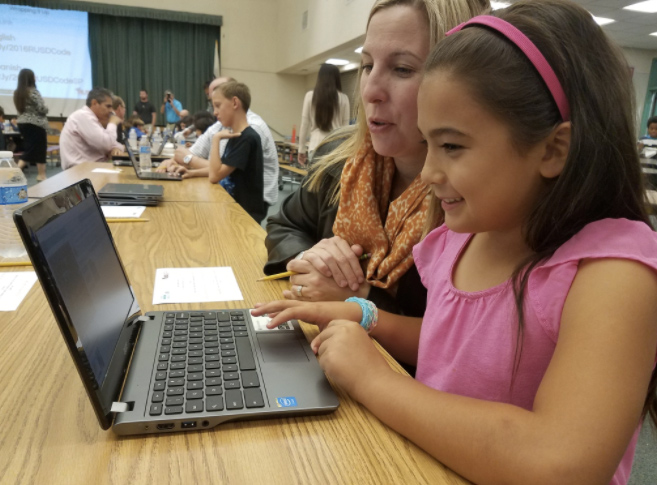
Students and families learn coding together during Family Code Night at Riverside Unified School District organized in collaboration with the Inland Code Consortium, a new effort to bring computer science to nine school districts across the Inland Empire of California. Photo Credit: RUSD Communications
September 9, 2018 - SACRAMENTO—The State Board of Education last Thursday approved California’s first-ever computer science standards—learning expectations that will help each student reach their creative potential in our digitally connected world.
“As a forward-leaning state and home to Silicon Valley, California’s new standards will not only enable students to understand how their digital world works but will encourage critical thinking and discussion about the broader ethical and social implications and questions related to the growing capabilities of technology,” said State Board Member Trish Williams, who serves as the Board’s computer science liaison.
Developed by educators, the standards are designed to help students move from passive users of technology to creators and innovators who interact with computers. Beyond simply learning to code, the standards push students to communicate as scientists and find creative solutions to difficult problems.
State Superintendent of Public Instruction Tom Torlakson said the standards would help improve computer science education in California.
“These standards will give our students a deeper understanding of computer science that will better prepare our students for careers and college and help them succeed in a fiercely competitive global economy,” Torlakson said.
“California’s economy, including a high tech industry that leads the world, will also benefit because employers will be able to hire workers with a better understanding of computer science and technology, and the skills to use technology to solve problems.”
The standards place a strong emphasis on equity by providing educators with examples of ways they can broaden participation in computer science to include diverse students. While 60 percent of California’s student population is Latinx or African American, only about 25 percent of students who take high school computer science courses are from these demographic groups. In the technology workforce, Latinx and African Americans represent about 15 percent of employees.
Also at today’s meeting, the Board was presented with a resolution from Assemblymember Marc Berman’s staff designating September 2018 as Computer Science Month in California.
The road to adoption of the standards began in 2014 with Governor Brown’s signing of Assembly Bill 1539, which directed California’s Instructional Quality Commission to recommend computer science standards to the State Board by July 2019. The state subsequently met with focus groups and later convened a Computer Science Standards Advisory Committee of teachers, professors, and administrators. That group developed the standards that were adopted today using work already in progress by the Computer Science Teachers Association.
“The standards approved today were built off the most recent national consensus on what concepts and practices in computer science all students should have access to learning from kindergarten through high school,” Board Member Williams said.
Computer science as a foundational discipline that should be accessible to all students is relatively new to K–12 education. It is the study of how technology and computing systems are created and their impact on society. The standards cover six core computer science concepts (such as algorithms and programming) and seven core practices (such as creating computational artifacts and recognizing computational problems). By contrast, learning to type, word processing, computer repair, and playing video games are not within the scope computer science as defined by the standards.
A strategic plan for scaling up computer science education in California, including providing appropriate support to educators and ensuring access and equity for all students, is expected to come before the State Board for approval in March 2019.Source: CDE








